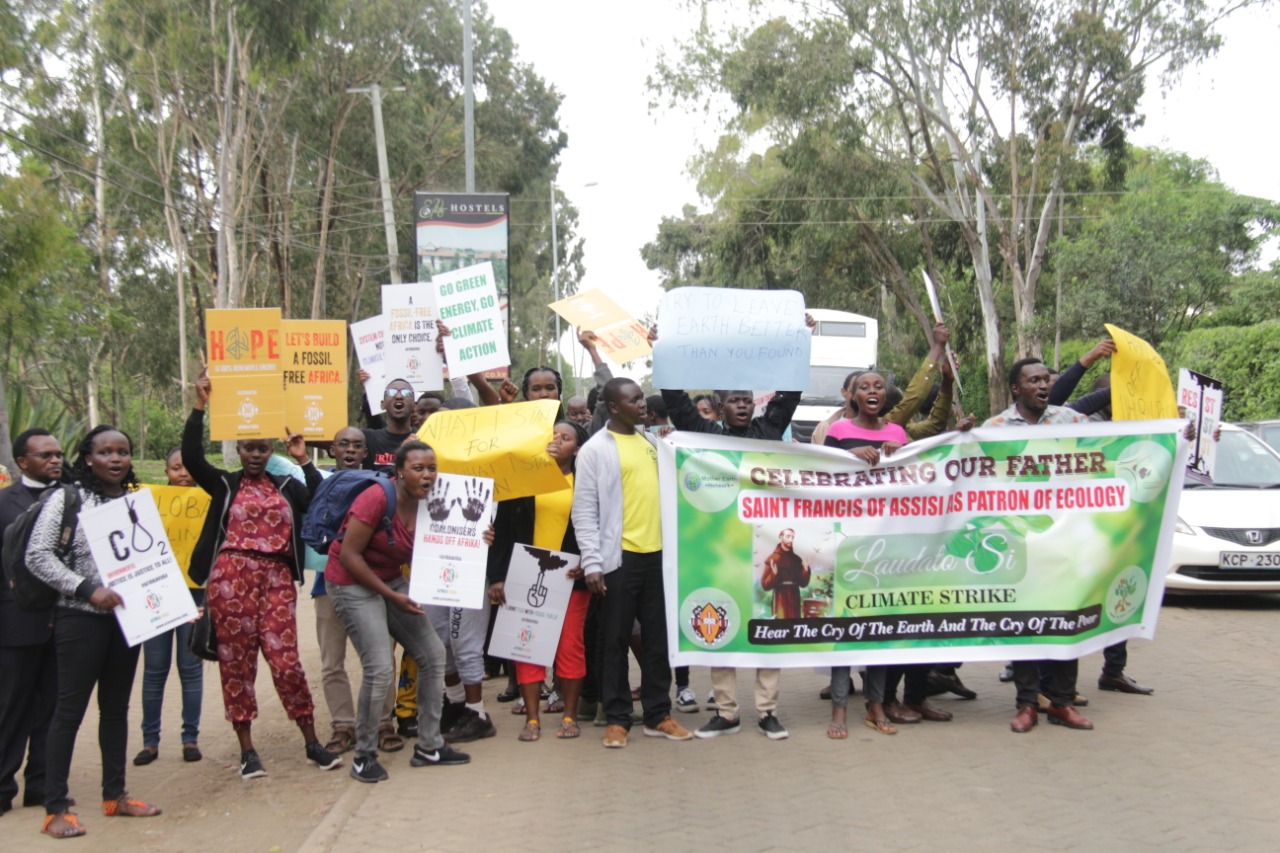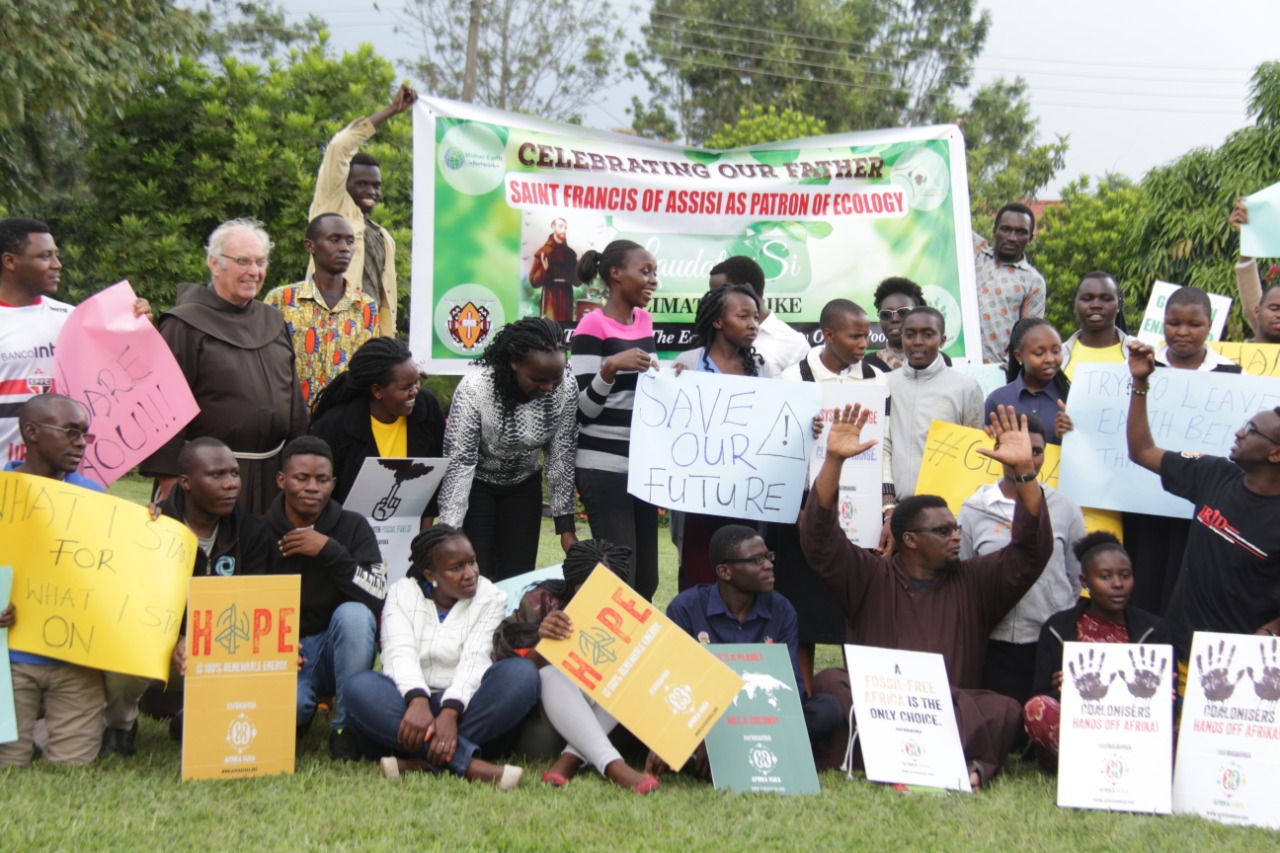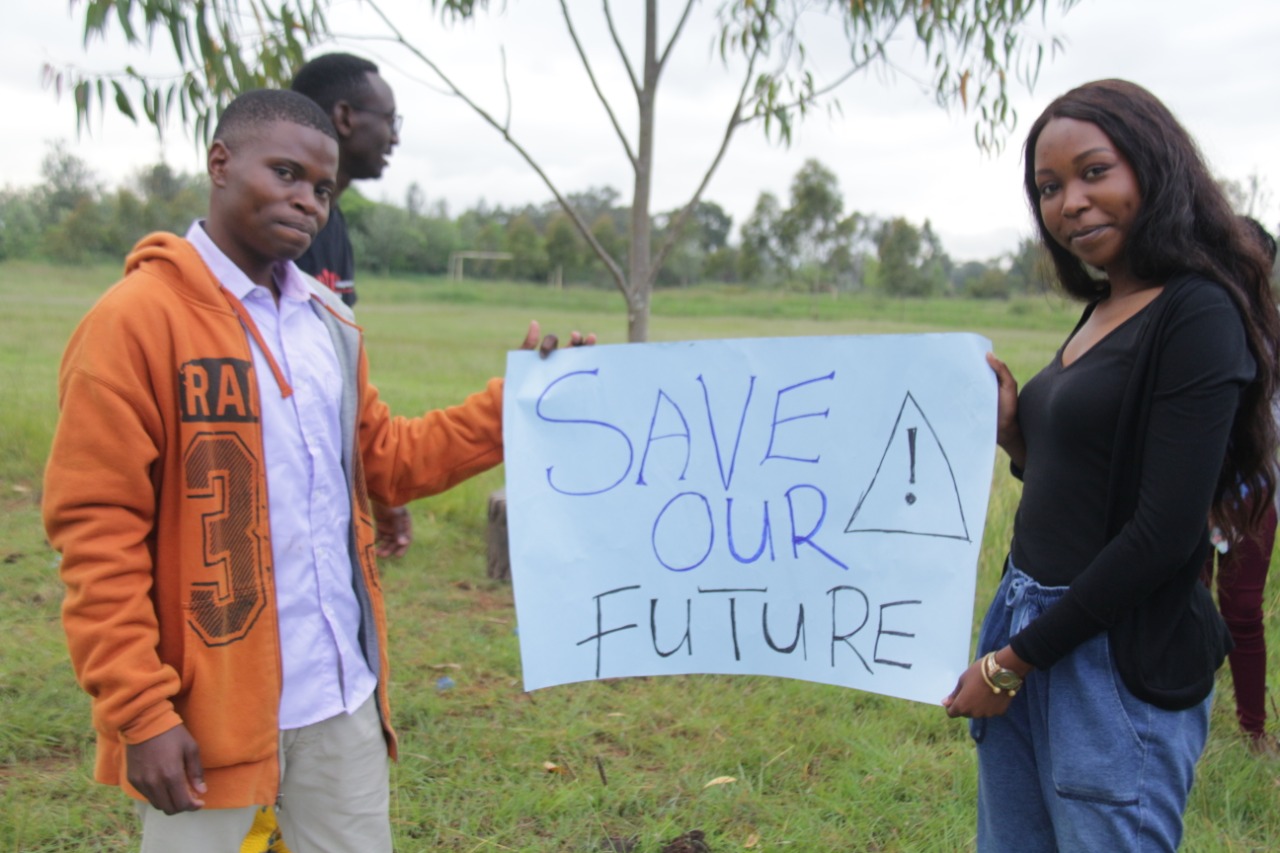The AfrikaVuka Caravan
All across Africa, frontline communities have been stepping up to demand action on climate change from their local leaders not only to protect their environment but also their culture and livelihood.
On May 25th 2019, 350Africa.org in collaboration with many frontline community organizations all across the African continent launched the AfrikaVuka platform with the intent of creating a space where these communities could exchange skills, tactics and show solidarity to each other by getting a deeper understanding of each others campaigns and resistance to climate change and how they can offer each other support.
From May 28th to August 6th, 350Africa.org under the Afrika Vuka platform will be organizing a series of 6 out-of-the-box webinars dubbed the Afrika Vuka Caravan, which takes the form of a virtual caravan running through Kenya, Senegal, Ghana, DRC, SA and Uganda telling the stories of the iconic campaigns in these countries. The webinars will draw upon the collective need to protect the planet by enabling people from across the continent to offer support, lend a voice and show solidarity to these campaigns and the people on the frontlines of these struggles despite the distance brought about by not only geography but also social distancing owing to the global coronavirus pandemic.
The AfrikaVuka Caravan will highlight: stopping the Bargny Coal Plant in Senegal, pushing for fracking to be banned in South Africa, halting the proposed Coal Powered Plant in the exquisite Lamu, Kenya, stopping oil exploration in the iconic Virunga Park in DRC, amplifying the need for renewable energy solutions in Ghana and last but most definitely not least pushing the Standard Bank to not finance the proposed crude oil pipeline that will cut across Uganda and Tanzania.
We are stronger and steadier together, and by lending our voices we can transform our continent by demonstrating that development can take place while protecting our earth, culture, and our people. Let us keep building resilience against the fossil fuel nightmare and Vuka (Rise Up) to a brighter future lit by renewable and sustainable sources of energy.
Author: Rukiya Khamis, 350Africa.org Anglophone Field Organiser.
Stronger than Covid-19
Many of us are dealing with uncertainty, fear, loss of livelihoods, and anxiety about the future. Some of us are doing our best to adapt. And many of us are looking for ways to help each other. In these unprecedented and challenging times, caring for one another is the highest priority.
As the world continues to trap in to help slow the spread of Covid-19, one of the most interesting phenomena taking place is the creative, quirky, and inspiring ways from people across Africa and beyond to cope with the pandemic.
We recently asked a few of our organisers to talk about how they're dealing with being quarantined at home.
There are so many parallels between the climate crisis and the global COVID-19 pandemic. It’s global in scope. Historically marginalized communities are the most impacted. And corporations, including Big Oil, are trying their hardest to push politicians to put profit before people.
Many of us are longing for lockdowns to end and normal life to return. But we need to remember that “normal” was already a crisis. “Normal” was greed and inequality, poverty, destruction of nature, and climate breakdown.
Despite the growing uncertainty that produces all kinds of feelings in us and our communities, this is not the time to be discouraged. This is rather an opportunity to respond creatively, to take care of each other, and to demonstrate solidarity with the most vulnerable and affected ones.
The period of rebuilding and recovery after the Covid-19 crisis opens up choices, and we need to choose to build back a better and more just world. Our covid-19 response must put people and the planet – not corporations and polluting industries – first. It’s time to demonstrate Ubuntu values and that together Africans are stronger than COVID-19. It’s time for a Just Recovery from COVID-19.
We would also like to hear from you: tell us what’s going on in your neighbourhood, or community. How are you coping and responding? Your knowledge and experience can help many across the world. Send us a picture and/or a video.
By Landry Ninteretse, 350Africa.org Managing Director.
Adentan Municipality contributes towards the 100% renewable energy in Ghana
‘Has anyone gone up North of Ghana? Some parts of our country are getting warmer and one of the objectives of the International communities is to reduce the earth’s overall temperature by 1.5 degrees, it is each of our responsibility to ensure we maintain Ghana’s NDCs and offer our contribution to solving the climate crisis” said Mr Foster Gyamfe of the Ministry of Finance Economic Strategy and Research division, at a workshop organized by 350 GROC at Adentan Municipal Assembly. Mrs Gifty Owusu - Nhyira of the Ecobank Ghana an accredited entity to the Green Climate Fund (GCF) lauded the initiative of the GROC Team “our doors are open to review and advise on any climate intervention projects from this workshop”
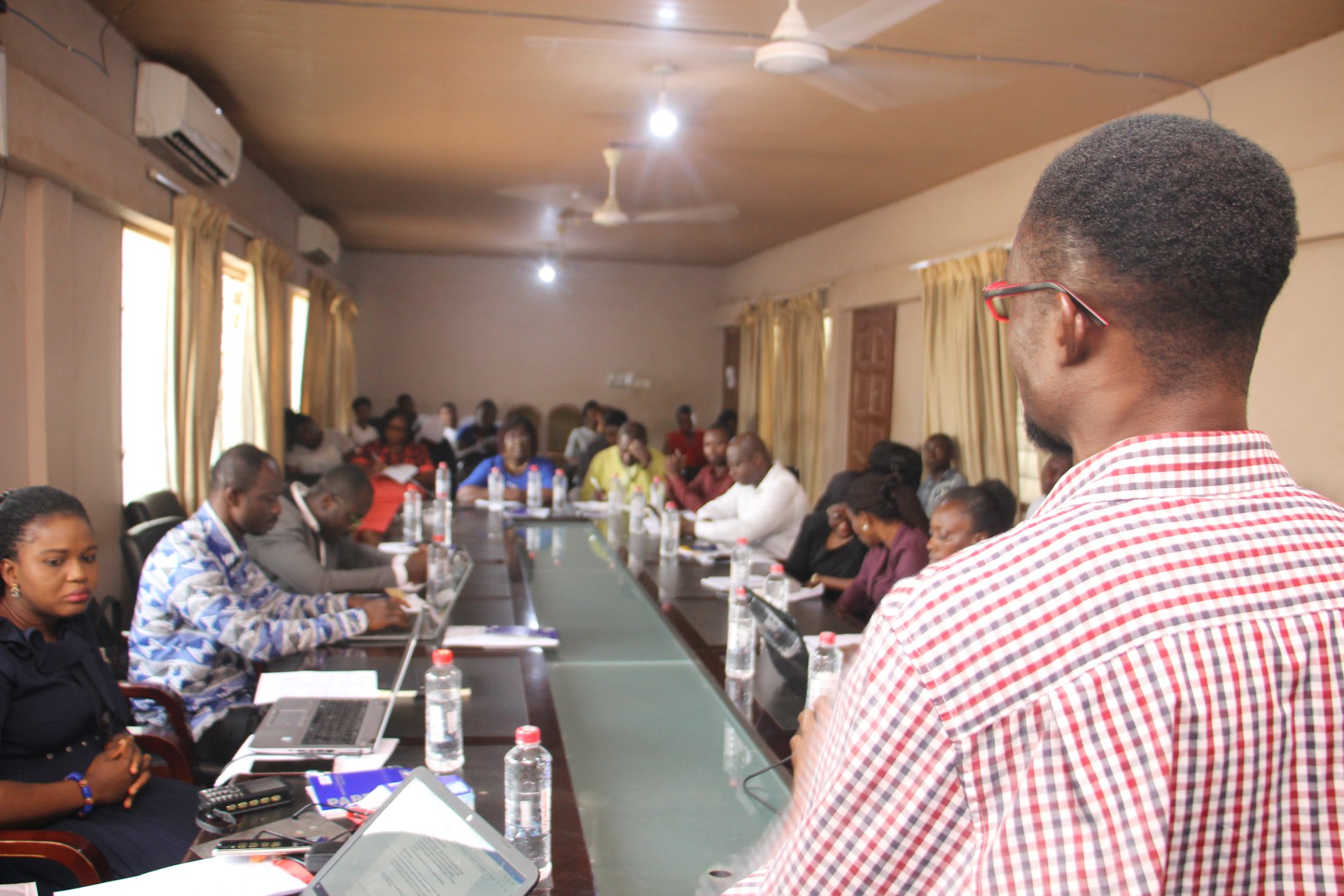
The workshop was held as part of the Renewable Energy for Communities (RE4C) campaign by 350 GROC and it brought together 40 participants, that is,25 members from the district and 15 partners. The workshop offered a space to discuss the present renewable energy plans in the Municipality, the failures and successes in the implementation of the pre-existing plans and finally the GROC team worked alongside the community to draft the renewable energy plan of the Adentan Municipality that is more viable.
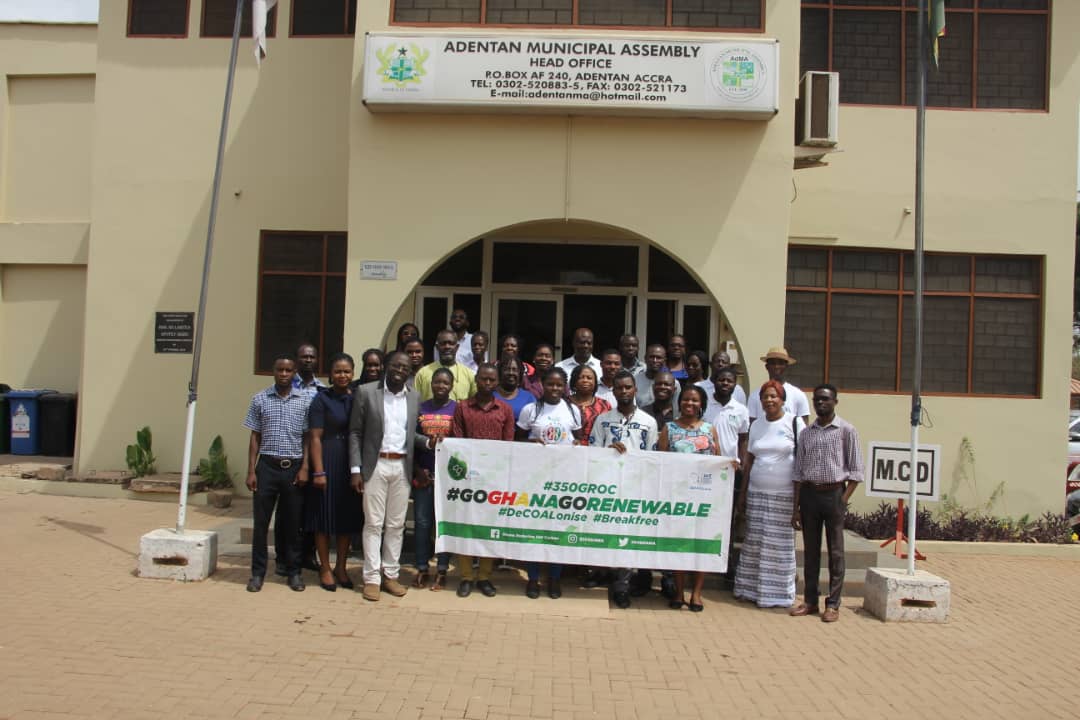
Adentan Municipality is amongst the 5 districts in Ghana that 350 GROC is working with for this phase of the Renewable Energy for Communities (RE4C) campaign. Success in the incorporation of the 5 district renewable energy plans in the existing Medium Term Development Plans, would be another milestone for 350 GROC after a long fight to stop the establishment of coal-fired power plants in Ghana, as it endeavours to promote nationwide renewable energy awareness geared towards sustainable development.
People of Onupi and Nigeria do not need coal
“I want the Federal Government to intercede for us so our women won't experience miscarriage again". "If the government was providing social amenities to community members, then we would have never accepted the destructive coal mining activities". Those are words of respectively Mrs Agagwu Rachel and Mr Alfa Stephen, the chairman of Onupi Coal Committee when attending the civil society meeting organized by GIFSEP and partners like International Center for Investigative Reporting (ICIR), Heinrich Boll Foundation, Climate and Sustainable Development Network and Global Rights to mark World Social Justice Day.
The meeting was an opportunity for community leaders and civil society groups to strategize on the way forward in ensuring the voices of the community members in both Kogi and Gombe states are heard and to advocate for a coal-free society that keeps social justice and safety at the forefront.
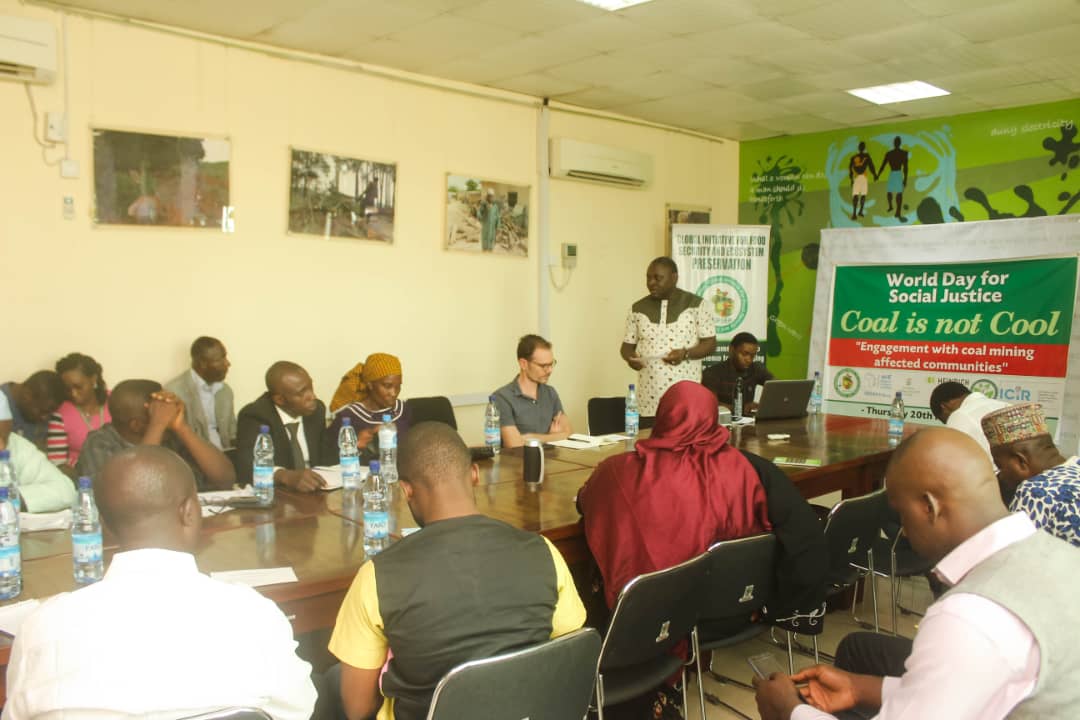
The gathering was inspired by a research GIFSEP did last year to ascertain the status of coal mining and to identify the actors and financiers of coal mining in Nigeria. The research carried out by the International Center for Investigative Reporting (ICIR) in Kogi and Gombe states with support from 350.org was a response to the shift in fossil fuel investment caused by Nigeria’s yawning gap in power generation and supply, which prompted many stakeholders including the members of the National Assembly to demand coal-powered stations.
This research revealed serious troubling impacts local communities are now confronted due to the activities of Dangote coal mine. These impacts include the destruction of water sources contamination of alternative borehole sources, health issues like high rates of miscarriage. More detailed information about the research’s findings can be viewed here.
Community members of Kogi and Gombe states alongside others in Nigeria intend to continue raising their voices to ensure their right to a clean and healthy environment filled with sustainable prosperity. According to participants, the meeting was just the beginning of the journey towards a coal-free Onupi and Nigeria.
Climate Defenders gathering: Towards a consolidated strategy
Fifty climate defenders and activists from 23 countries gathered in Curitiba, Brazil from February 5th to 8th to share the stories of their struggles and to build a stronger community of climate defenders.
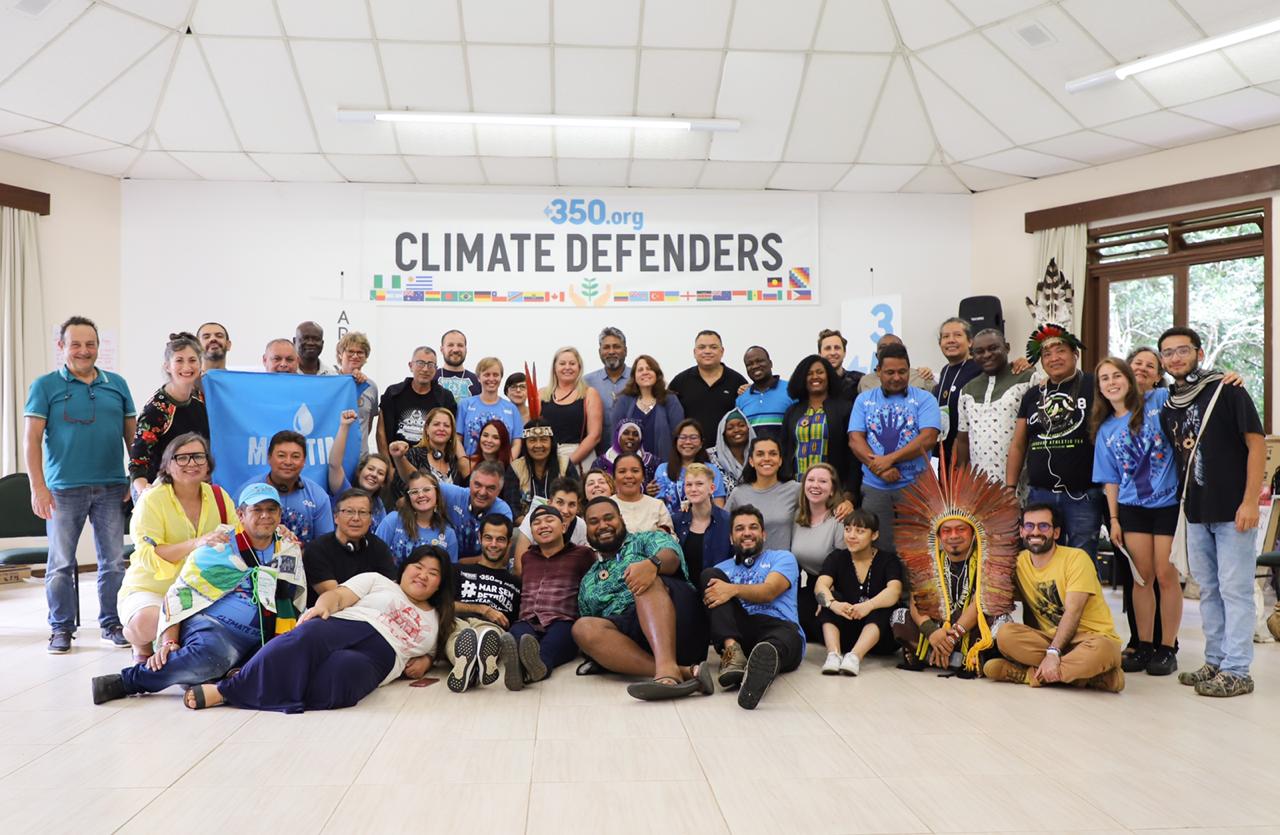
Everywhere climate defenders are facing threats, intimidation, and increased repression as they protect the planet from destruction. In most cases, the fossil fuel industry is responsible for the most severe and disturbing violations of human rights. This gathering provided a space to share experiences, skills and tactics and build a coherent strategy for reacting to crisis moments, including increased visibility, communications strengthened leadership, rapid response and building alliances of legal support.
African representatives at the gathering shared the most common threats they are confronted with, including intimidation by government officials and police, restricted movements and surveillance, forced removal of communities and sometimes verbal abuse by being labelled for instance as ‘anti-development’ activists. They denounced the fossil fuel companies working hand in hand with corrupt politicians, security forces and sometimes private militia in perpetrating such disturbing violations of human rights and freedom.
During the gathering, 350.org launched the Climate Defenders report on Human Rights Abuses by Fossil Fuel Companies. The report highlighted some specific cases from Africa where companies such as Shell in Nigeria) and Amu Power in Lamu (Kenya) are involved. The report shows successful strategies that activists are taking to fight these cases.
"Chevron-Texaco and Shell are directly responsible for more than 45,000 deaths caused by health issues, the displacement of 60,000 people and the dump of more than 18 billion gallons of toxic wastewater into rivers" #AfrikaVuka https://t.co/nGJjxGuVyZ pic.twitter.com/h4ZFDvYQ74
— Christian (@christroi10) February 7, 2020
By targeting the fossil fuel industry, climate activists are attacking directly the heart of the climate crisis. They are not only defending life and nature but also pushing back the increased repression on civil society groups while exposing the liability of the fossil fuel industry in human rights abuses.
Among the proposed solutions to strengthen their fights, participants at the gathering suggested cross-regional solidarity between countries with common struggles, working on the existing protocols to strengthen protection mechanisms and ensuring greater connections between climate activists and the wider human rights defenders community.
Author: Christian Hounkannou, 350Africa Francophone Field Organiser.
Kenya and Nigeria joined divestEd!
Divestment from fossil fuels has been gaining quite the momentum globally in the last few years. This week two youth groups in Kenya and Nigeria took action, joining the Fossil Fuel Divestment Day.
On 12th February, students in the Chiromo campus of the University of Nairobi, Kenya engaged in a 1-hour sit-in session. The forum attracted over 40 participants and took the form of a participatory dialogue to exchange on the need to invest in renewable energy in the campus, its advantages, as well as reaching out to other campuses to follow suit. The students, mostly drawn from the Chiromo Environmental Awareness Club and environmental scientists in the making had strong contributions on how renewable energy on campuses could look like, citing the need for academia and researchers to take a lead in implementing solutions to the fight against the climate crisis.
It happened! We are likely the first across the world to host the #divestED event owing to our special circumstances that could not allow us a quorum tomorrow.
Thanks for all students in @ceackenya who hosted us, and keenly contributed to the dialogue. @divesteddotorg pic.twitter.com/jn4zNNShp6
— Y-CEARE (@YCeare) February 12, 2020
Among the emerging issues was the need to have a strong legal requirement that enables campuses and institutions to have renewable energy systems as a part of them going green in energy production and usage. The action was led by Y-CEARE (Youth Coalition for Environmental Advocacy and Renewable Energy), a team part of AfrikaVuka.
In Nigeria, GIFSEP (Global Initiative on Food Security and Ecosystem Preservation) held a workshop on reducing carbon footprint, followed by a mock protest within the university of Abuja, targeting students from the department of geography and environmental management. The team intended to encourage the department to join the ongoing efforts to transition from fossil fuels addiction to renewable energy. Students specifically asked the university administration to switch to renewable energy and install solar panels on top of administrative and campuses blocs.
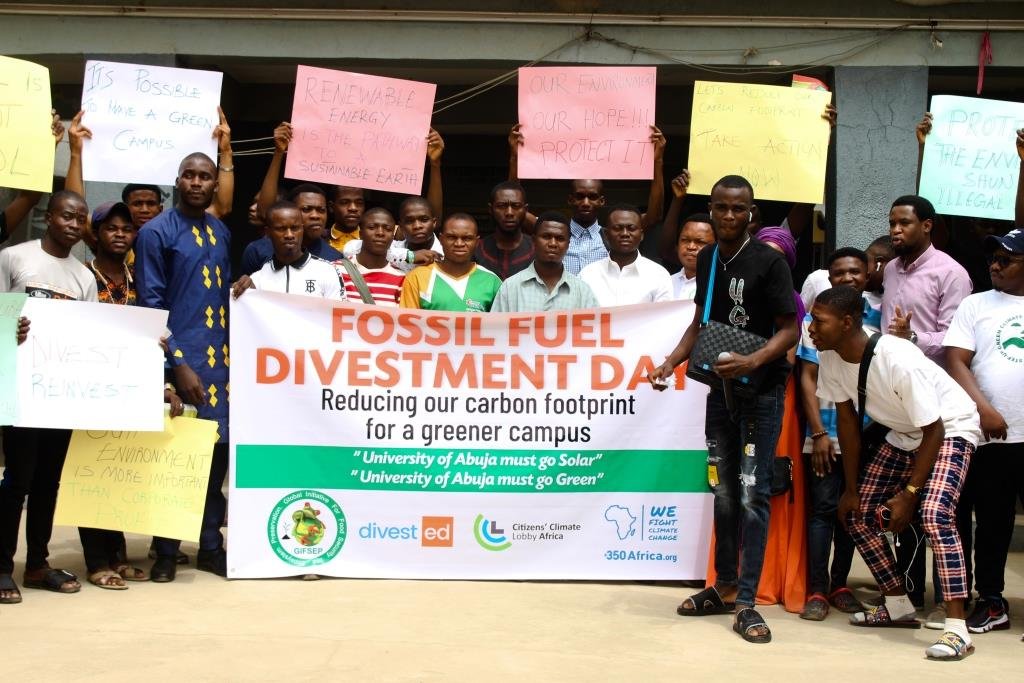
When asked about what to expect after this divestEd initiative, Joseph Ibrahim of GIFSEP said “We are still having issues of unstable electricity supply. We believe this initiative will inspire the students and the university to take on renewable energy and create an example for other campuses and schools and hopefully Nigeria as a whole. ”
I was at University of Abuja today to make a climate change presentation and joined the students to demand for a greener campus #F2D2 #FossilFuelDivestmentDay #Afrikavuka pic.twitter.com/0J1CMcunDl
— Joseph Ibrahim (@joeibro) February 13, 2020
Both teams joined the Fossil Fuel Divestment Day or divestEd, a mobilisation moment led by US divestment students to demand specific institutions to divest from fossil-fueled destruction of land, air, and water and re-invest in renewable energy.
Author: Rukiya Khamis, 350Africa.org Anglophone Field Organizer.
Celebrating the 40th anniversary of St Francis of Assisi as patron of ecology by striking for climate
November 29th this year coincided with the 40 year anniversary of Saint Francis of Assisi as Patron of Ecology. He was declared by Pope John Paul II in 1979 on the same date.
Mother Earth Network in collaboration with The office of Justice Peace and Integrity of Creation Franciscans Africa celebrated the anniversary by striking for climate in the afternoon of Friday, November 29th November, from 3.00 pm to 6.00 pm.
The event brought together 120 participants: Franciscans brothers and sisters, Secular Franciscans, Youfra, the climate movement group from The Catholic University of Eastern Africa and other stakeholders.
The event started with a learning session of conscientization about Laudato Si and St Francis of Assisi spirituality. The discussion was also focused on COP25 happening in Madrid, Spain. In the same regards, some interviews and testimonies were recorded to be shared worldwide.
After that, we e then started the walk for climate justice from the Franciscan Family centre towards The Catholic University of Eastern Africa. During the walk, people were carrying placards and banners with messages like. No need for fossil fuel in Kenya, Mr President to stop any oil business in Kenya, For people in COP25 to honour Paris Agreement etc. The event ended by planting 200 trees for the commemoration of St Francis of Assisi 40 years as patron of ecology.
By Steeven Kezamutima, JPIC Franciscans Africa
The flowers of revolution
The struggle for human rights starts when another person takes land and subjugates the people of that land through laws that undermine their personhood. So what is liberation? Why does the idea of freedom run in the blood of so many and why is it so contagious? The decolonization of Africa was a radical and transformative period where young leaders took to organizing themselves and spoke of the injustices that saw the majority African population being pushed out of economic participation, being dehumanized and outright exploited for labour.
Colonization was the unadulterated rape of nations in the greedy pursuit of control for our natural resources. And slowly this penetration of colonial power seeped into the social fabric of African livelihoods, manifesting as displacement, the vulnerability of women and children heightened, and poverty and injustice became a daily reality.
Tell me today, African child do you not see the same pattern taking on the form in the fossil fuel industry; greed, a disregard for human life and the suffering of many? Tell me African child do you not see the seeds of discord being sowed among us, with promises of jobs, houses and money while our environment is being ripped to shreds, our diversity is being corroded and we are now forced into the exile of the self.
The continent is not being divided by countries any more as with the Berlin Agreement of 1885, it is being chopped up by Exxon, Shell, BP, Total, Anglo American PLC, Sasol Mining, Glencore Xstrata, Exxaro and South32’s South Africa Energy Coal, Yanzhou Coal, Shaanxi Coal.
And as the impacts of climate change increase and we see the rains don’t come, the signs of the times are here. The direct consequences of man-made climate change include: rising maximum temperatures, rising minimum temperatures, rising sea levels
higher ocean temperatures, an increase or decrease in precipitation ( rain and hail)
shrinking glaciers and thawing permafrost. The indirect consequences of climate change, which directly affect us humans and our environment, include an increase in food and water crises, especially in Africa, health risks through rising air temperatures and heatwaves. The economic implications of dealing with secondary damage related to climate change mean vulnerable African countries will go into more debt when the secure loans from foreign nations with natural resource interests.
I come from a family of activists, we are inherently activists, every single African. In us, we have the spirit of radical leaders who brought freedom to nations such as Jomo Kenyatta(Kenya), Kwame Nkrumah(Ghana), Julius Nyerere(Tanzania), Léopold Sédar Senghor(Senegal), Nnamdi Azikiwe(Nigeria), and Félix Houphouët-Boigny(Côte d'Ivoire)
The hunger for freedom starts with one and catches like wildfire. We have everything to lose and we have run out of patience. We are the flowers of revolution and we demand revolutionary energy for our future. The time to deCOALonize is here. #AfrikaVuka
Join a Global ClImate strike near you www.globalclimatestrike.net
Telling the African Climate Movement Story
Earlier this month, I had the pleasure and privilege to travel to Gisenyi in Rwanda for a #AfrikaVuka digital organizing and storytelling skills training.
About 20 activists gathered from across Africa to participate in the training. We spent 4 days sharing knowledge, stories, and songs, while building trust and digital organizing skills to take the #AfrikaVuka movement to the next level.
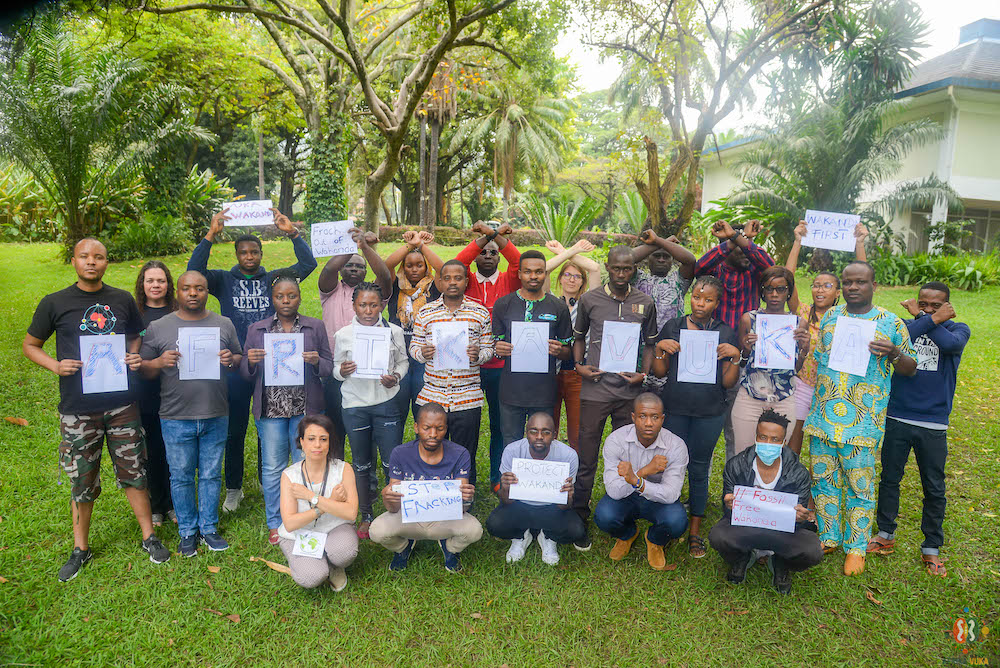
As discussions on the importance of climate stories unfolded, common themes crossing geographic boundaries gave insight into how stories all over Africa are being told. It became imminent that in order to grow the climate movement in Africa, communities living at the frontlines of climate change need to own their stories -- and also challenge the way stories about Africa are told in general.
Entrenched narratives of Africa have often left the continent misunderstood. Crude descriptions of Africa, scaling from the ‘Dark Continent’ to the ‘Emerging One” ignore the complexities of Africa. Instead of trapping Africa into a single story or narrative, this retreat became a space to talk about storytelling practices that speak in their own voice and organizing tools that resonate with people and empower them to tell stories as they are.
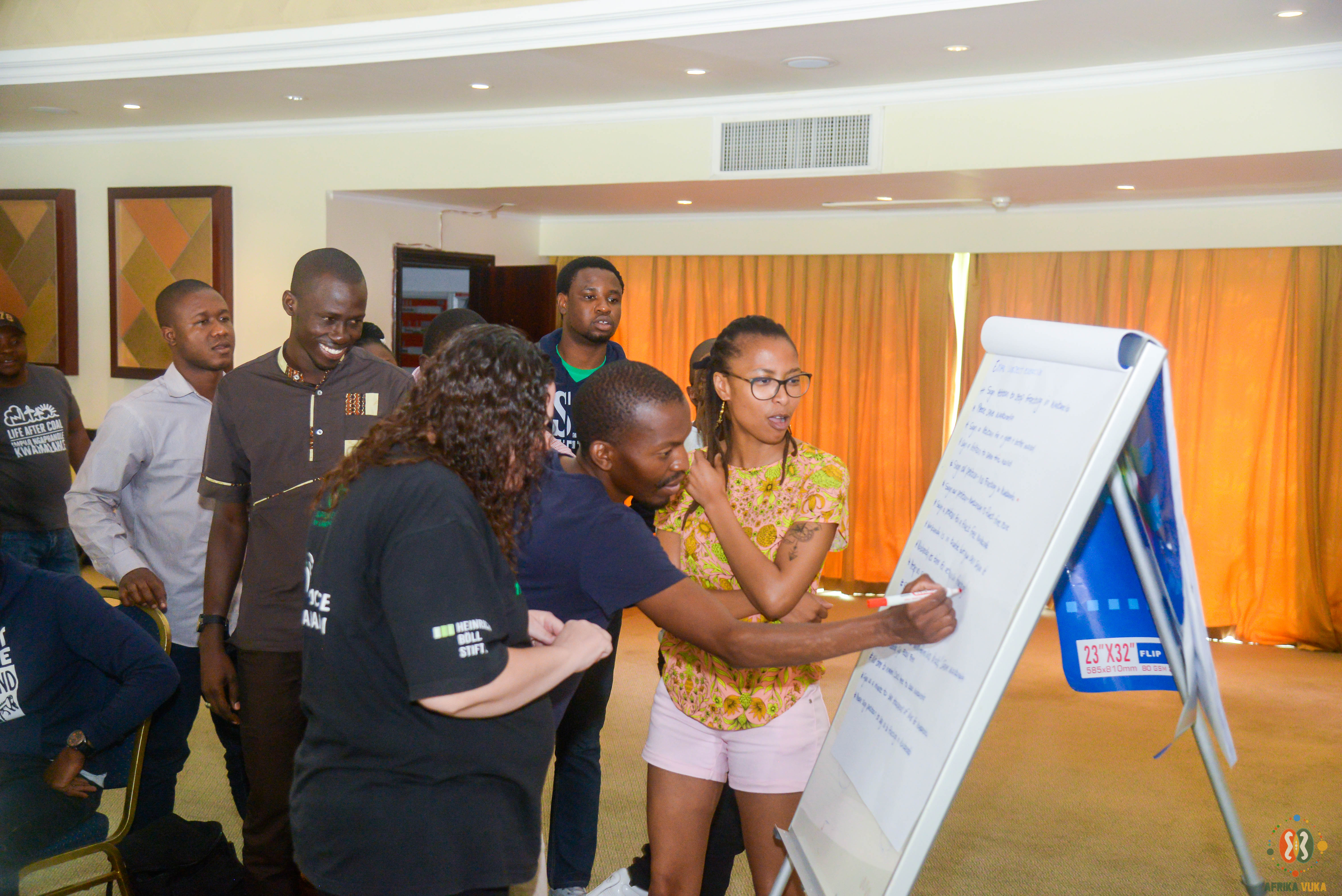
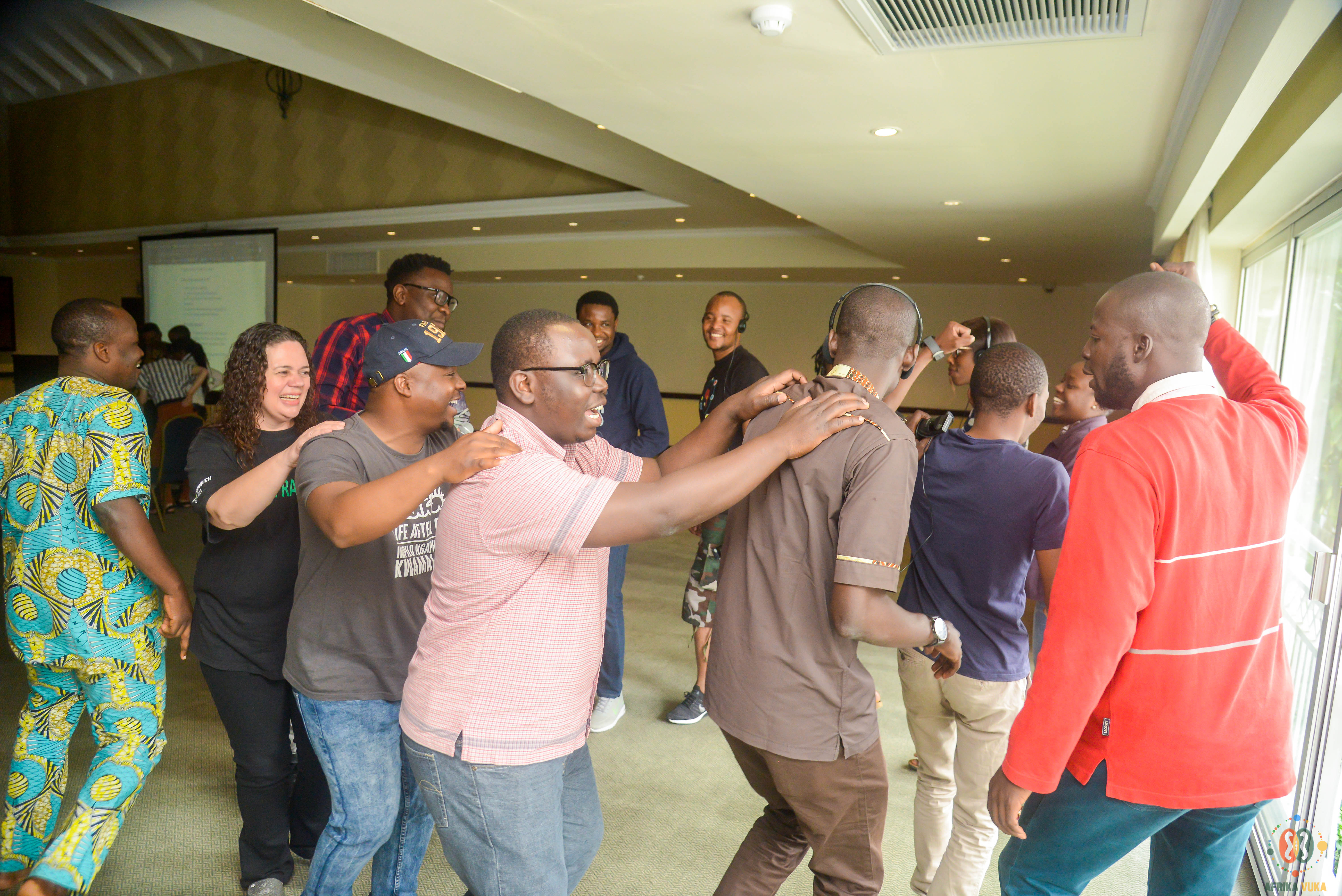
Key take-aways:
- It’s clear that we have to go through a mental shift in our perception of the climate movement in the African context. These experiences can be united with efforts to tackle the climate crisis on a global scale.
- Connecting the climate fights across Africa isn’t only about solidarity, it’s also about strategy. It’s about recognizing that climate change isn’t a single-issue problem. We need to organize not just around climate change, but building the kind of solidarity and unity and that can bring on a massive economic and social transformation that works for everyone -- and use tools and storytelling tactics that speak in individual voices and tools that resonate with our communities.
As the retreat came to a close, a participant shared his story with the group and said: I left my stable life in the UK to go back home and do something about the climate crisis. To me, this is not just about the climate, this is about survival. I can’t think of a better way to convey how I was quickly reminded about the urgency and importance of the work we’re doing together. The need for collective action couldn't be more urgent. As the climate crisis accelerates, it’s up to all of us to take risks for a more just and sustainable world while we still can.
The powerful activists that I met in Gisenyi took their newfound skills and connections back to their local contexts. They’re ready to mobilize in solidarity with communities and take the fight against fossil fuels to the next level. Next stop is the Global Climate Strike. These activists will join thousands of people around the world to organise climate strikes in workplaces and communities on 20 and 27 September. Find out more here.
More: As part of the storytelling session, participants were asked to create content that explains why they’re in the fight for climate justice. Here’s some of what came out it:
Photos:
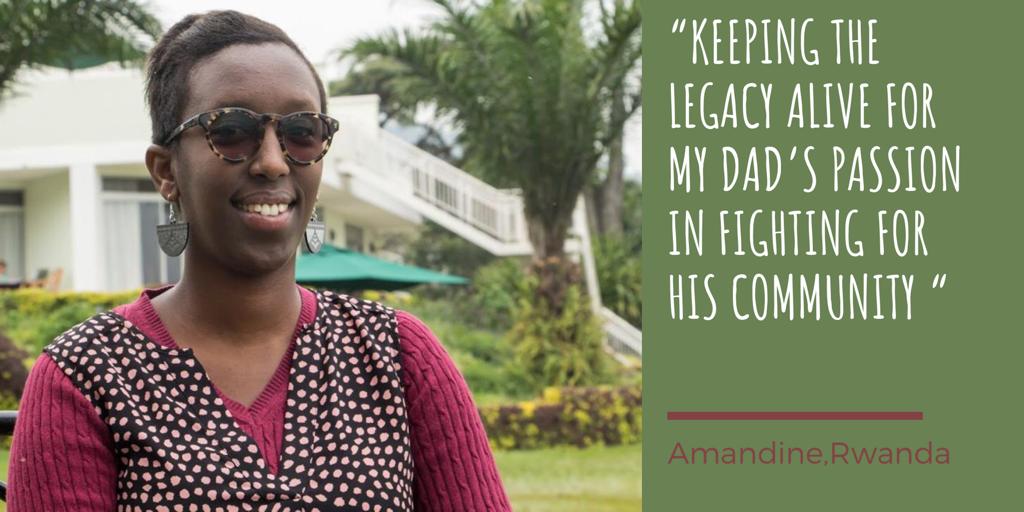
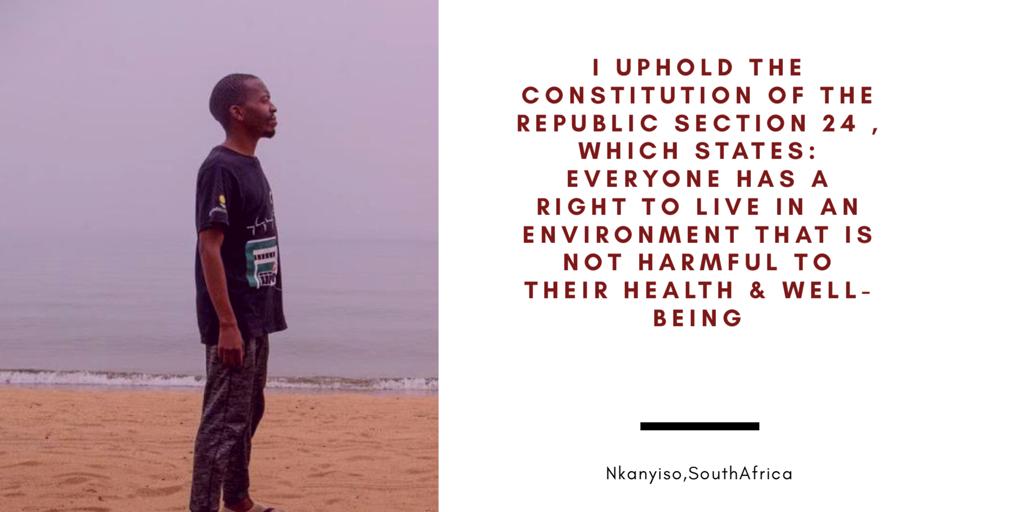
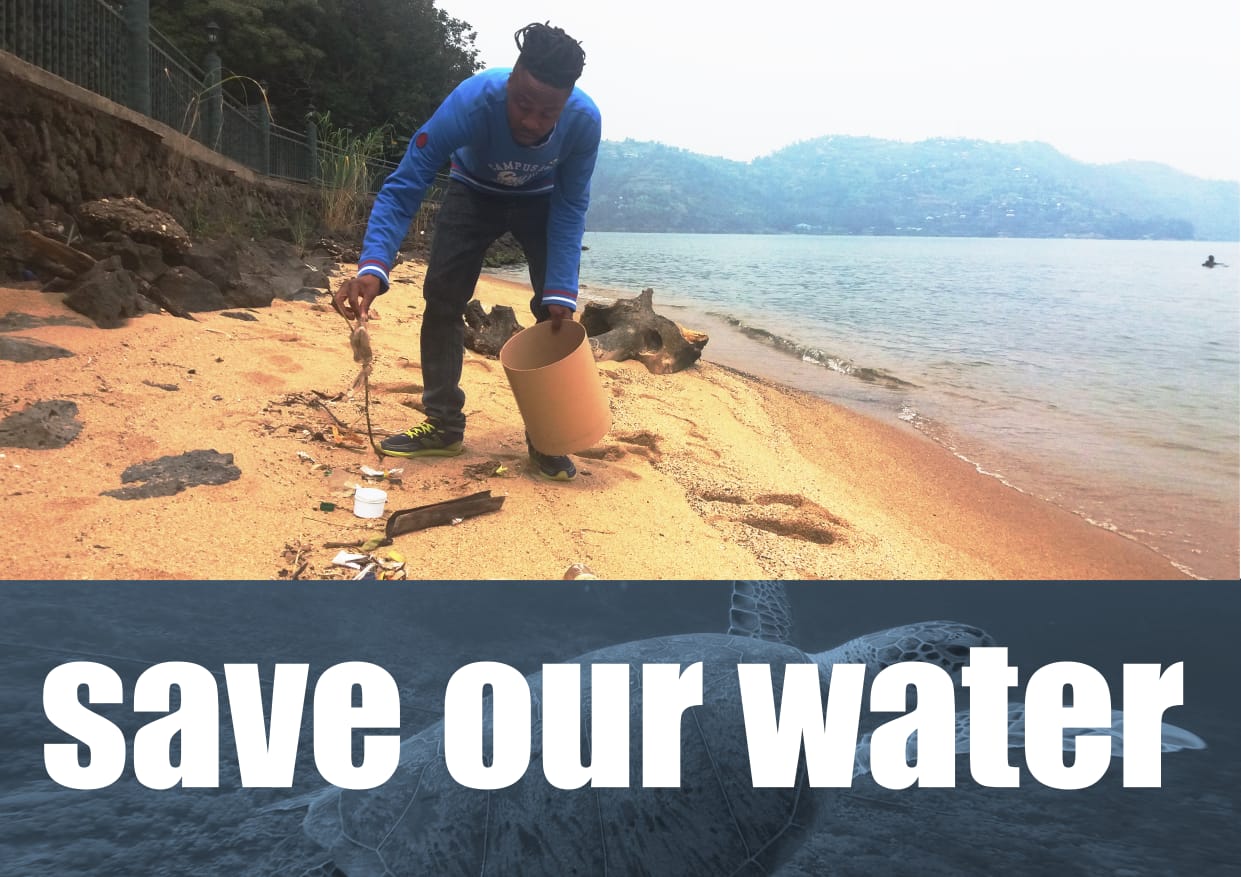
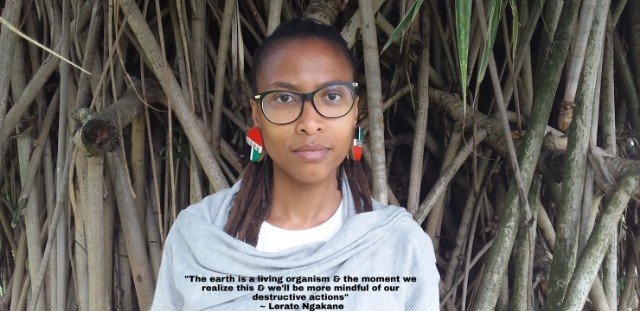
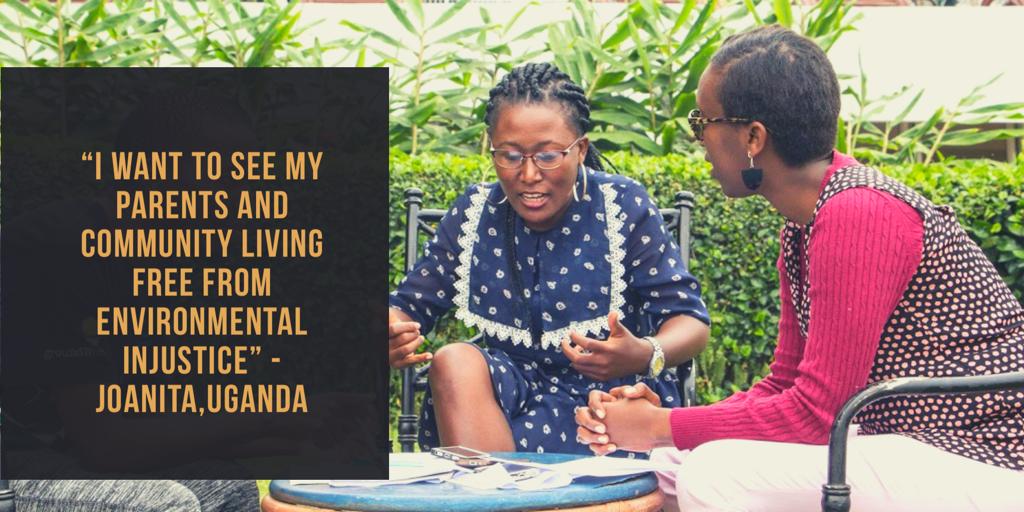
Videos:
Author: Chris Kif, 350Africa Digital Campaign Manager
Kenya doesn't need coal, Report reaffirms
A new report on the proposed Lamu coal plant in Kenya reveals that the project is a huge mistake in terms of investments, excessive power generation and electricity costs for consumers.
The report entitled The Proposed Lamu Coal Plant: The Wrong Choice for Kenya presented on the10th of June in Nairobi cautioned that the project would be ‘locking the country into a 25-year deal at a cost to consumers of more than US$9 billion, even if the plant never generates any power”.

Some of the highlights of the report which was compiled by the Institute for Energy Economics and Financial Analysis (IEEFA) include:
- Amu Power’s claims for the cost of Lamu-generated electricity are unrealistically low, based on outdated costs for the imported coal that will be burned and on overly optimistic assumptions about how much electricity the plant will generate.
- Using more realistic assumptions about future Lamu generation and coal costs, electricity from the plant could cost as much as 75 cents per kilowatt-hour (KWh), on average, during the years 2024 to 2037—more than 10 times what the plant’s proponents have claimed.
- This estimate does not include costs for port upgrades that would be required to bring coal to the plant, nor construction of the transmission infrastructure needed to distribute the power; the costs of these projects would add significantly to Lamu’s overall impact on electricity consumers and taxpayers.
The report also reaffirmed that the country doesn’t need any coal generation project, but should rather actively explore its abundant renewable resources to satisfy the likely growth scenarios.

Reacting to that release, the Kenyan government said it intends “to delay the Lamu coal-fired power plant to avoid a situation where Kenyans will end up paying for unused power if demand fails to keep up with the project’s output”.
“The coal plant will be built in the next four to five years as part of the Government strategy to delay new power over cost concerns’ said the Energy Principal Secretary Joseph Njoroge
This is a great move in this campaign which has been going on for over five years. Lamu residents, activists, scientists and other social justice groups had fiercely challenged the project, pointing out its numerous dangerous impacts in terms of people’s health, livelihoods and ecosystems.
Author: Rukiya Khamis.


